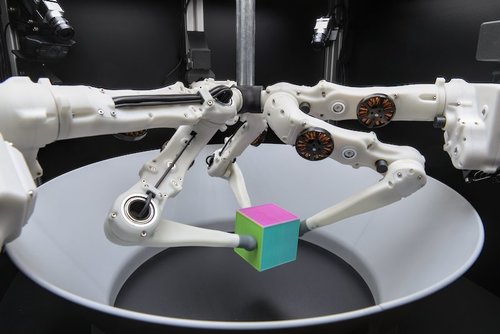2024
Andrussow, I., Sun, H., Martius, G., Kuchenbecker, K. J.
Demonstration: Minsight - A Soft Vision-Based Tactile Sensor for Robotic Fingertips
Hands-on demonstration presented at the Conference on Robot Learning (CoRL), Munich, Germany, November 2024 (misc) Accepted
Bonse, M. J., Gebhard, T. D., Dannert, F. A., Absil, O., Cantalloube, F., Christiaens, V., Cugno, G., Garvin, E. O., Hayoz, J., Kasper, M., Matthews, E., Schölkopf, B., Quanz, S. P.
Use the 4S (Signal-Safe Speckle Subtraction): Explainable Machine Learning reveals the Giant Exoplanet AF Lep b in High-Contrast Imaging Data from 2011
2024 (misc) Submitted
Rajendran, G., Buchholz, S., Aragam, B., Schölkopf, B., Ravikumar, P.
Learning Interpretable Concepts: Unifying Causal Representation Learning and Foundation Models
2024 (misc)
2023
Bottou, L., Schölkopf, B.
Borges und die Künstliche Intelligenz
2023, published in Frankfurter Allgemeine Zeitung, 18 December 2023, Nr. 294 (misc)
2022
Wang, H., Jin, Z., Cao, J., Fung, G. P. C., Wong, K.
Inconsistent Few-Shot Relation Classification via Cross-Attentional Prototype Networks with Contrastive Learning
2022 (misc)
2021
Prabhoo, S., Bauer, S., Schwab, P.
NCoRE: Neural Counterfactual Representation Learning for Combinations of Treatments
2021 (misc)
Abdulsamad, H., Dorau, T., Belousov, B., Zhu, J., Peters, J.
Distributionally Robust Trajectory Optimization Under Uncertain Dynamics via Relative-Entropy Trust Regions
2021 (misc)
Arvanitidis, G., González Duque, M., Pouplin, A., Kalatzis, D., Hauberg, S.
Pulling back information geometry
2021 (misc)
Wüthrich*, M., Widmaier*, F., Bauer*, S., Funk, N., Urain, J., Peters, J., Watson, J., Chen, C., Srinivasan, K., Zhang, J., Zhang, J., Walter, M. R., Madan, R., Schaff, C., Maeda, T., Yoneda, T., Yarats, D., Allshire, A., Gordon, E. K., Bhattacharjee, T., Srinivasa, S. S., Garg, A., Buchholz, A., Stark, S., Steinbrenner, T., Akpo, J., Joshi, S., Agrawal, V., Schölkopf, B.
A Robot Cluster for Reproducible Research in Dexterous Manipulation
2021, *equal contribution (misc)
Belousov, B., H., A., Klink, P., Parisi, S., Peters, J.
Reinforcement Learning Algorithms: Analysis and Applications
883, Studies in Computational Intelligence, Springer International Publishing, 2021 (book)
Panda, S., Shen, C., Perry, R., Zorn, J., Lutz, A., Priebe, C. E., Vogelstein, J. T.
Nonpar MANOVA via Independence Testing
2021 (misc)
Shao, K., Villegas, J. F. R., Logothetis, N. K., Besserve, M.
A model of Ponto-Geniculo-Occipital waves supports bidirectional control of cortical plasticity across sleep-stages
2021 (misc) In preparation
Georgiev, B., Franken, L., Mukherjee, M., Arvanitidis, G.
On the Impact of Stable Ranks in Deep Nets
2021 (misc)
Perry, R., Tomita, T. M., Mehta, R., Arroyo, J., Patsolic, J., Falk, B., Vogelstein, J. T.
Manifold forests: closing the gap on neural networks
2021 (misc)
Perry, R., Mehta, R., Guo, R., Yezerets, E., Arroyo, J., Powell, M., Helm, H., Shen, C., Vogelstein, J. T.
Random Forests for Adaptive Nearest Neighbor Estimation of Information-Theoretic Quantities
2021 (misc)
Allshire, A., Mittal, M., Lodaya, V., Makoviychuk, V., Makoviichuk, D., Widmaier, F., Wüthrich, M., Bauer, S., Handa, A., Garg, A.
Transferring Dexterous Manipulation from GPU Simulation to a Remote Real-World TriFinger
2021 (misc)
2020
Chicharro, D., Besserve, M., Panzeri, S.
Causal learning with sufficient statistics: an information bottleneck approach
2020 (misc) Submitted
Jin, D., Jin, Z., Mihalcea, R.
Deep Learning for Text Attribute Transfer: A Survey
2020 (misc)
Tosatto, S., Stadtmueller, J., Peters, J.
Dimensionality Reduction of Movement Primitives in Parameter Space
2020 (misc)
Jin, Z., Yang, Y., Qiu, X., Zhang, Z.
Relation of the Relations: A New Paradigm of the Relation Extraction Problem
2020 (misc)
Ke, R., Bilaniuk, O., Goyal, A., Bauer, S., Larochelle, H., Schölkopf, B., Mozer, M. C., Pal, C., Bengio, Y.
Learning Neural Causal Models from Unknown Interventions
2020 (misc)
2019
Park, M., Jitkrittum, W.
ABCDP: Approximate Bayesian Computation Meets Differential Privacy
2019 (misc) Submitted
Pfister, N., Bauer, S., Peters, J.
Identifying Causal Structure in Large-Scale Kinetic Systems
2019 (misc)
Tanneberg, D., Rueckert, E., Peters, J.
Learning Algorithmic Solutions to Symbolic Planning Tasks with a Neural Computer Architecture
2019 (misc)
2018
Schölkopf, B.
Die kybernetische Revolution
S{\"u}ddeutsche Zeitung, 2018, (15-Mar-2018) (misc)
Veiga, F. F., Edin, B. B., Peters, J.
In-Hand Object Stabilization by Independent Finger Control
2018 (misc)
Garreau, D., Jitkrittum, W., Kanagawa, M.
Large sample analysis of the median heuristic
2018 (misc) In preparation
2017
Peters, J., Janzing, D., Schölkopf, B.
Elements of Causal Inference - Foundations and Learning Algorithms
Adaptive Computation and Machine Learning Series, The MIT Press, Cambridge, MA, USA, 2017 (book)
Bousquet, O., Gelly, S., Tolstikhin, I., Simon-Gabriel, C. J., Schölkopf, B.
From Optimal Transport to Generative Modeling: the VEGAN cookbook
2017 (misc)
Belousov, B., Peters, J.
f-Divergence constrained policy improvement
2017 (misc)
2016
Empirical Inference (2010-2015)
Scientific Advisory Board Report, 2016 (misc)
Mittal, A., Raj, A., Namboodiri, V. P., Tuytelaars, T.
Unsupervised Domain Adaptation in the Wild : Dealing with Asymmetric Label Set
2016 (misc)
2014
Kober, J., Peters, J.
Learning Motor Skills: From Algorithms to Robot Experiments
97, pages: 191, Springer Tracts in Advanced Robotics, Springer, 2014 (book)
Schultz, T., Nedjati-Gilani, G., Venkataraman, A., O’Donnell, L., Panagiotaki, E.
Computational Diffusion MRI and Brain Connectivity
pages: 255, Mathematics and Visualization, Springer, 2014 (book)
2013
Schölkopf, B., Luo, Z., Vovk, V.
Empirical Inference - Festschrift in Honor of Vladimir N. Vapnik
Springer, 2013 (book)
2011
Sra, S., Nowozin, S., Wright, S.
Optimization for Machine Learning
pages: 494, Neural information processing series, MIT Press, Cambridge, MA, USA, December 2011 (book)
Barber, D., Cemgil, A., Chiappa, S.
Bayesian Time Series Models
pages: 432, Cambridge University Press, Cambridge, UK, August 2011 (book)
Lu, H., Schölkopf, B., Zhao, H.
Handbook of Statistical Bioinformatics
pages: 627, Springer Handbooks of Computational Statistics, Springer, Berlin, Germany, 2011 (book)
2010
Sigaud, O., Peters, J.
From Motor Learning to Interaction Learning in Robots
pages: 538, Studies in Computational Intelligence ; 264, (Editors: O Sigaud, J Peters), Springer, Berlin, Germany, January 2010 (book)
2008
Peters, J.
Machine Learning for Robotics: Learning Methods for Robot Motor Skills
pages: 107 , (Editors: J Peters), VDM-Verlag, Saarbrücken, Germany, May 2008 (book)
2007
Bakir, G., Hofmann, T., Schölkopf, B., Smola, A., Taskar, B., Vishwanathan, S.
Predicting Structured Data
pages: 360, Advances in neural information processing systems, MIT Press, Cambridge, MA, USA, September 2007 (book)
Bottou, L., Chapelle, O., DeCoste, D., Weston, J.
Large-Scale Kernel Machines
pages: 416, Neural Information Processing Series, MIT Press, Cambridge, MA, USA, September 2007 (book)
Wichman, F., Ernst, MO.
Mathematik der Wahrnehmung: Wendepunkte
Akademische Mitteilungen zw{\"o}lf: F{\"u}nf Sinne, pages: 32-37, 2007 (misc)


